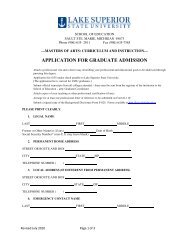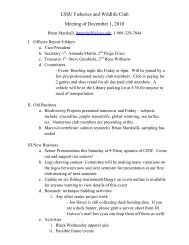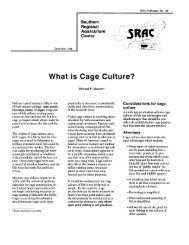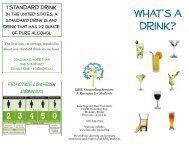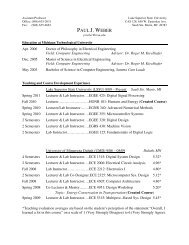Feeling better about moral dilemmas - Lake Superior State University
Feeling better about moral dilemmas - Lake Superior State University
Feeling better about moral dilemmas - Lake Superior State University
You also want an ePaper? Increase the reach of your titles
YUMPU automatically turns print PDFs into web optimized ePapers that Google loves.
Journal of Moral Education<br />
Vol. 34, No. 1, March 2005, pp. 43–55<br />
<strong>Feeling</strong> <strong>better</strong> <strong>about</strong> <strong>moral</strong> <strong>dilemmas</strong><br />
Jason K. Swedene *<br />
<strong>Lake</strong> <strong>Superior</strong> <strong>State</strong> <strong>University</strong>, USA<br />
There has been a trend in contemporary ethics to believe that a <strong>moral</strong>ly admirable agent would feel<br />
negative self-assessing emotions following even the best possible choice in a <strong>moral</strong> dilemma. A<br />
commonly held reason for holding this position is that agents who are well-brought up are trained<br />
to feel negative self-assessing emotions when they do something <strong>moral</strong>ly forbidden under ordinary<br />
circumstances, and that agents acting for the best in a dilemma will nonetheless recognize their<br />
deed as <strong>moral</strong>ly forbidden. I challenge this view and reach the conclusion that without the further<br />
notion that the agent <strong>moral</strong>ly failed, negative self-assessing emotions ought to be discouraged in<br />
favour of emotions such as grief and sadness, which are negative and self-conscious, but not selfassessing.<br />
I then offer some cognitive strategies <strong>moral</strong> educators could impart to help persons feel<br />
emotions that <strong>better</strong> reflect the nuances of <strong>moral</strong> <strong>dilemmas</strong>.<br />
We ought to have been brought up in a particular way from our very youth, as Plato<br />
says, so as to both delight in and to be pained by the things that we ought. (Aristotle,<br />
Nicomachean Ethics, 1104b, 11–13)<br />
Our world is such that we must make tough decisions, as we navigate the many<br />
demands of modern life. There are indeed a plurality of values and a plurality of<br />
situations in which we must choose between actions that embody competing and<br />
irreducible values. When we need our <strong>moral</strong>ity most may turn out to be precisely the<br />
time in which we likely will not feel pleasant <strong>about</strong> acting in accordance with it.<br />
Since virtue is connected with how we feel <strong>about</strong> acting <strong>moral</strong>ly, should a virtuous<br />
agent acting as <strong>moral</strong>ly as he can be expected to feel distress? What kind of distress?<br />
The impetus for this brief essay is to respond to commonly held views that a virtuous<br />
agent would feel painful self-assessing emotions, such as guilt or agent-regret, even<br />
in cases wherein the agent acts for the best. The most accepted position, referred to<br />
as the ‘habituation view’, celebrates dilemmatic negative self-assessing emotions as<br />
by-products of a sound <strong>moral</strong> upbringing. I shall argue that while the habituation<br />
view provides a useful explanation of why good agents often do feel badly even when<br />
they have acted with <strong>moral</strong> responsibility, the habituation view cannot substantiate<br />
itself unless it is supplemented with the claim that the dilemmatic action was<br />
categorically wrong, a position few ethicists would support. The challenge now<br />
*<strong>Lake</strong> <strong>Superior</strong> <strong>State</strong> <strong>University</strong>, Department of Arts, Letters and Social Sciences, 650 W.<br />
Easterday Avenue, Sault Sainte Marie, MI, 49783, USA. Email: jswedene@lssu.edu<br />
ISSN 0305-7240 (print)/ISSN 1465-3877 (online)/05/010043-13<br />
# 2005 Journal of Moral Education Ltd<br />
DOI: 10.1080/03057240500049307
44 J. K. Swedene<br />
becomes how to integrate a revised emotional awareness into our <strong>moral</strong> instruction<br />
so that we might be pained only at the things we ought.<br />
Moral <strong>dilemmas</strong> and the virtuous agent’s emotional profile: the habituation<br />
view<br />
Emotions have a significant place in our <strong>moral</strong> lives. Our emotions inform us of<br />
<strong>moral</strong> salience, contribute to deliberation, connect us with other human beings, and<br />
alert us (sometimes painfully) that we have acted im<strong>moral</strong>ly. The self-assessing<br />
emotions in particular bear so much on our <strong>moral</strong> lives because they function to<br />
draw attention to the ways in which we interact with the world. Both guilt and agentregret,<br />
for example, alert us to <strong>moral</strong> wrongdoing. Guilt and agent-regret are<br />
negative self-assessing emotions. By ‘negative self-assessing emotions’ I mean those<br />
emotions which include a discomfort (hence, ‘negative’) directed at the self (hence,<br />
‘self-assessing’). All self-assessing emotions seem to indicate that one’s character is<br />
attuned to the world, one’s life, and one’s action. And, of course, the virtuous person<br />
would be so attuned. All self-assessing emotions, and a fortiori all negative selfassessing<br />
emotions, involve a cognition or belief <strong>about</strong> the self’s role in the greater<br />
world. I might feel a negative self-assessing emotion in the aftermath of betraying the<br />
trust of a friend. In that case, I would notice that such behaviour is wrong, harmful,<br />
and that it was me who performed that wrong behaviour.<br />
Granted that a virtuous agent would hold a proper belief <strong>about</strong> her role in the<br />
action (an intellectual virtue) and react properly (a <strong>moral</strong> virtue), we might wonder<br />
why she persists in experiencing a negative self-assessing emotion following<br />
dilemmatic action. Would not a proper belief at least include the content that the<br />
agent acted for the best, acted reasonably, or some other variant? Most of us would<br />
grant that even as the dilemmatic virtuous agent acts for the best with compunction,<br />
the agent would nonetheless believe that she acts appropriately given the<br />
circumstances. And moreover, it is that very belief of propriety that allows her to<br />
follow through with tough decisions even as competing imperatives pull her in<br />
opposing directions. Yet a significant number of ethicists continue to defend the<br />
thesis that negative self-assessing emotions in the wake of dilemmatic action are<br />
warranted, perhaps even to be celebrated. For the remainder of this essay, I employ<br />
examples of severe and tragic <strong>dilemmas</strong> frequently addressed in the literature. If an<br />
agent may be emancipated from negative self-assessing emotions following his killing<br />
an offspring, he certainly may be emancipated from such emotions following<br />
breaking a promise to a colleague.<br />
The habituation view considers negative self-assessing emotions as non-specific,<br />
involuntary emotional responses constitutive of <strong>moral</strong> virtue. When an admirable<br />
agent commits an action perceived to be incongruent with his integrity and <strong>moral</strong><br />
values, feeling a negative self-assessing emotion is inevitable. In fact, Daniel Statman<br />
(1990) has argued that should the agent fail to feel such an emotion in response to<br />
dilemmatic action, the agent must not have been brought up properly. The <strong>moral</strong>ly<br />
admirable agent, so the claim runs, is sensitive to harm and authentic in<br />
acknowledging his causing the harm. For Statman (1990, p. 199), ‘Dispositions
<strong>Feeling</strong> <strong>better</strong> <strong>about</strong> <strong>moral</strong> <strong>dilemmas</strong> 45<br />
cannot be switched on and off at will’. Once habituated to feel regretful, guilty, or<br />
ashamed should he perform some prima facie wrong act, he cannot but experience<br />
those emotions even when circumstances ‘force’ him to do it. This is essentially the<br />
utilitarian R. M. Hare’s (1981) thinking too: emotions are instilled as an efficient<br />
way of motivating behaviour in normal circumstances. Dilemmatic action may elicit<br />
these emotional reactions inculcated by a sound <strong>moral</strong> upbringing.<br />
Ruth Barcan Marcus (1980) claims that the agent who does not feel dilemmatic<br />
guilt lacks <strong>moral</strong> awareness. The agent either has not internalized a <strong>moral</strong> principle<br />
that should have been internalized or does not recognize that his action conflicts with<br />
the <strong>moral</strong> principle. She writes:<br />
Where an agent acknowledges conflicting obligations, there is sufficient overlap with<br />
dilemma-free cases of <strong>moral</strong> failure to warrant describing the associated feelings where<br />
present as guilt, and where absent as appropriate to an agent with <strong>moral</strong> sensibility.<br />
(Marcus, 1980, p. 132)<br />
Since dilemmatic actions resemble non-dilemmatic actions, the well-disposed<br />
cannot help but to feel guilt. Moral sensibility entails that guilt be felt.<br />
If the habituation view held by Statman, Hare, and Marcus is correct, then<br />
Aristotle may very well have missed something important when he proposed that we<br />
should be habituated to experience pleasure in response to acting well and pain in<br />
response to acting poorly. How would the virtuous ship captain feel after tossing<br />
overboard treasured cargo to secure the lives of his crew? In Nicomachean Ethics<br />
Book IV. 9, Aristotle (McKeon, 1941) argues that we would not praise an adult for<br />
feeling a negative self-assessing emotion because that adult should not do anything<br />
that calls for that feeling. Just because the conditional ‘If a good man did x, then he<br />
would feel y’ is true does not entail that ‘A good man would feel y’ is true. A good<br />
man would never do x’. (And the careful thinker would never affirm the<br />
consequent!) Yet even Aristotle in Book III agrees that there are cases of dilemma<br />
in which a good man might do something incongruent with his character, such as<br />
doing something base under the orders of an unprincipled tyrant.<br />
The psychological claim ‘<strong>moral</strong>ly admirable agents will feel y in circumstances z’<br />
entails ‘those who aim to be <strong>moral</strong>ly admirable should cultivate the disposition to<br />
feel y in circumstances z’. Thus, the psychological claim takes the imperative form of<br />
a <strong>moral</strong> claim. Moral education is precisely for those who aim to be <strong>moral</strong>ly<br />
admirable. I take issue with both the psychological and <strong>moral</strong> claims.<br />
Moral <strong>dilemmas</strong> and the virtuous agent’s emotional profile: critique of the<br />
habituation view<br />
The habituation view is attractive for various reasons. Negative self-assessing<br />
emotions are generated by an asymmetry between a <strong>moral</strong>ly admirable character and<br />
some perceived feature of his <strong>moral</strong> act. An admirable <strong>moral</strong> agent would have been<br />
brought up to recognize when his action produces harm. Following a <strong>moral</strong><br />
dilemma, the agent perceives a <strong>moral</strong>ly salient feature of his environment, the harm,
46 J. K. Swedene<br />
and the <strong>moral</strong>ly salient feature of the cause of that harm: himself. This elicits the<br />
negative self-assessing emotion.<br />
Of course, the admirable agent would notice certain features of his world which<br />
bear upon <strong>moral</strong>ity, and react as one who noticed those features should react. The<br />
noticed features neatly fall into two classes, each corresponding to an intentional<br />
object of the self-assessing emotion. A first feature is that someone has been harmed<br />
and a second is an acknowledgement that the self brought <strong>about</strong> that harm.<br />
Regarding the first intentional object, the other person, we would have difficulty<br />
justifying why an admirable agent would not attune himself to the harm done. Harm,<br />
for our purposes, is defined as an effect that hinders or destroys another’s prospects<br />
for living well. Recognizing harm is a good thing: one who is aware of harm is in the<br />
best position to alleviate it and to prevent its further spread.<br />
One could, of course, argue that recognizing some harms (for example, the<br />
genocides and terror in Africa, abhorrent labour conditions, children being sold into<br />
sexual slavery) might lead to an anxiety that makes worthwhile life impossible. On<br />
this view, some harm must be ignored, and if it cannot be ignored, it must be<br />
forgotten quickly lest it consume us. But such a view could hardly be sustained. Even<br />
supposing a most disturbing example of harm, the carnage in Sierra Leone, I cannot<br />
see why recognizing harm should ever be dissuaded. For much of the last decade<br />
rebel forces in Sierra Leone massacred, raped, burned, and mutilated civilians, while<br />
paramilitary forces responded in kind. The amount of human harm in the region is<br />
undeniable. All <strong>moral</strong>ly sensitive persons would recognize the suffering and harm of<br />
the civilians tragically caught in the terror of a civil war, but surely not all of them<br />
respond to that recognition in the same way. Some may grow discouraged; others<br />
may become motivated to work towards ending the suffering. Very few persons<br />
become the radical altruist and commit the self-sacrifice of fully devoting themselves<br />
to the cause. The point need not be pushed further: responses to harm are not<br />
determined simply by our recognition of it. Whereas some recognition of harm may<br />
lead one to take unreasonable or even unjust measures in response, desensitizing<br />
ourselves to harm would make us callous, indecent, and <strong>moral</strong>ly blind.<br />
Now we must consider whether one who recognizes oneself as a <strong>moral</strong> contributor<br />
to dilemmatic harm is superior to one who does not. At first glance, the claim that one<br />
should recognize oneself as the <strong>moral</strong> contributor to harm seems unproblematic,<br />
perhaps even intuitively obvious. But for <strong>moral</strong> <strong>dilemmas</strong> which arise through no<br />
fault of the agent’s own, the circumstances that necessitate a forced choice make up<br />
the largest contributing source of harm. The Gestapo officer acting in the backdrop<br />
of institutionalized genocide is certainly a more primary <strong>moral</strong> source of harm than<br />
Styron’s (1976) Sophie. Sophie, recall, is compelled to choose which of her children<br />
will die at the hands of the Nazis. If other forces conspire to compel the horrible<br />
choice, then why overshadow that fact with the negative self-assessing emotion? The<br />
negative self-assessing emotions, and in particular guilt and agent-regret, focus<br />
<strong>moral</strong> censure onto the self disproportionately to the <strong>moral</strong> censure deserved by<br />
other agents. Moreover, why must these emotions imply even the slightest selfcensure<br />
when we acted appropriately given the circumstances of dilemma?
<strong>Feeling</strong> <strong>better</strong> <strong>about</strong> <strong>moral</strong> <strong>dilemmas</strong> 47<br />
Admittedly, we may celebrate the habituation view for its description of the<br />
perceptive capabilities of the virtuous agent. Specifically, its description of the<br />
implications of habituation is laudable. A person who has been habituated properly<br />
has the <strong>moral</strong> sensibility to notice, act, and react in ways that lead to a good life.<br />
That granted, when a person is habituated, even habituated properly, there may be<br />
times when he has to act contrary to disposition.<br />
For Aristotle, habituation is the most effective means (and indeed the only means)<br />
for instilling <strong>moral</strong> values in the inexperienced. Classroom learning is wasted on the<br />
young for the reason that one must first develop a ‘second nature’, a programmed<br />
system of responses to efficiently and effectively implement ethical imperatives. A<br />
sound <strong>moral</strong> upbringing emphasizes family, truth, and human life. A sound <strong>moral</strong><br />
theory teaches why they are essential. Sophie’s guilt is seen as appropriate because<br />
her guilt proceeds from a character which values the lives of her children. She has<br />
been habituated to feel guilty when she acts against her disposition. Conversely,<br />
Agamemnon’s lack of guilt at sacrificing Iphigenia for the sake of his crew and a<br />
victory in Troy is often seen as inappropriate given the duties of a father towards his<br />
offspring (see Lawall & Mack, 1999). An Agamemnon not saddled with guilt clearly<br />
lacks the disposition to value his child.<br />
On an explanatory level, the habituation view convincingly describes the products<br />
of a firm and unchanging disposition. An agent who faces two mutually exclusive<br />
and <strong>moral</strong>ly compelling act choices cannot help but have some aspect of his ultimate<br />
choice go against his disposition. Certainly our dispositions should be averse to<br />
killing family members. A world in which all of us hesitated before we put our family<br />
members in mortal danger is a <strong>better</strong> world than one that is not such a world. However,<br />
arguments supporting dilemmatic self-assessing emotions go much further.<br />
Marcus (1980) and Statman (1990) each claim that dilemmatic circumstances<br />
and dilemma-free circumstances resemble each other in enough ways that negative<br />
self-assessing emotions should follow both. However, locating the <strong>moral</strong>ly relevant<br />
resemblance is paramount. Whereas a negative focus on the self, integral to negative<br />
self-assessing emotions, is warranted by a dilemma-free case of <strong>moral</strong> failure, such a<br />
focus is not warranted in a dilemma that has arisen through no fault of the agent’s<br />
own. At best, the habituation view explains why it is understandable that an agent<br />
might feel a negative self-assessing emotion, but we are looking for more than<br />
arguments for why self-assessing emotions are ‘understandable’: we want to find out<br />
whether they are warranted and therefore to be encouraged.<br />
To begin to determine warrant, we might ask whether dilemmatic action<br />
resembles dilemma-free cases with respect to <strong>moral</strong> failure. Did the dilemmatic<br />
agent <strong>moral</strong>ly fail in a relevantly similar way as if she failed in a dilemma-free<br />
circumstance? It seems unfair to say that Sophie, who came into a horrific situation<br />
through no prior fault of her own, acted the best she could and yet still failed <strong>moral</strong>ly<br />
in a relevantly similar way as if she chose to give her daughter to a killer without<br />
duress. But of Sophie’s guilt, Greenspan (1983, p. 120) writes:<br />
As an ethical reaction … it seems warranted. She knows she is responsible for doing<br />
something wrong, something she could have avoided—even though she could not have
48 J. K. Swedene<br />
avoided doing wrong. The same would be true if she had chosen differently, and<br />
allowed both children to be killed. It would be strangely insensitive for a mother in her<br />
position not to experience guilt at either choice.<br />
Notice that Greenspan goes further than to say that Sophie’s self-assessing<br />
emotion is understandable: for Greenspan, ‘it seems warranted’ no matter which<br />
option Sophie chooses. So for Greenspan, Sophie has no choice but to fail <strong>moral</strong>ly.<br />
We could depart from Greenspan’s rationale and argue that Sophie fails by choosing<br />
at all—thus making her a culpable collaborator along with the officer. We would thus<br />
maintain a consistency that habituation view proponents do not, when they contend<br />
that Sophie is <strong>moral</strong>ly required to choose and fail.<br />
So, I submit here that there is no warrant for self-assessing emotions for cases of<br />
dilemma. But there is room, however, to support a negative emotion. A virtuous<br />
individual can be repulsed by a host of things, including the base actions of others. I<br />
am repulsed as the old are mistreated. I am repulsed at the person who does so. Any<br />
argument saying that the repulsion must take the form of self-assessing repulsion,<br />
then, must be supplemented by additional claims <strong>about</strong> the <strong>moral</strong> relevance of selfassessing<br />
emotions in dilemmatic circumstances. That is, a successful habituation<br />
view must explain why personal <strong>moral</strong> responsibility must imply the repulsion.<br />
Other reasons for endorsing dilemmatic self-assessing emotions<br />
It is clear that negative self-assessing emotions felt under the right circumstances are<br />
constitutive of <strong>moral</strong> virtue, so these emotions cannot be jettisoned without giving<br />
up virtue itself. But, my own position differs from the habituation view as to what are<br />
the right circumstances and the degree to which a virtuous agent can be expected to<br />
adapt emotionally to the nuances of circumstance. We must remember that the<br />
virtues have dispositional, affective, and intellectual aspects (Annas, 1993).<br />
Habituationists seem to forget <strong>about</strong> the intellectual aspects when they argue that<br />
dispositions cannot be switched off at will. To say that a virtuous agent would not<br />
have the intellect to have a true belief <strong>about</strong> his role in dilemmatic circumstances is<br />
not to have much faith in our virtuous agent.<br />
One could argue that emotions should be felt, since the agent is causally<br />
responsible for the ‘rejected alternative’. Marcus’s (1980, pp. 132–133) words are<br />
typical:<br />
Granted that, unlike agents who fail to meet their obligations simpliciter, the agent who<br />
was confronted with a <strong>moral</strong> dilemma may finally act on the best available reasons. Still,<br />
with respect to the rejected alternative he acknowledges a wrong in that he recognizes<br />
that it was within his power to do otherwise.<br />
Each option is in a sense wrong, regardless of whether the agent acts for the best or<br />
not. The agent’s well-intentioned method or rationale for choosing cannot offset the<br />
fact that what he chooses, ultimately, will be wrong. Some wrongdoing is<br />
inescapable. Some wrongdoing is intractable. Hence it is quite conceivable to some<br />
that a virtuous agent may act for the best, perform wrong, and blame himself for his<br />
choice.
But should not negative self-assessing emotions follow only those scenarios in<br />
which the agent bears both causal responsibility and <strong>moral</strong> responsibility? The<br />
former responsibility, though, is still in question. Commitment to certain <strong>moral</strong> ends<br />
does not imply that we bear <strong>moral</strong> responsibility when those ends are not attained.<br />
All of our choices are limited by circumstances and, by their being made, limit future<br />
choices. It would seem destructive (and silly) to go through life feeling negative selfassessing<br />
emotions every time that our characters are not fully represented by the<br />
things we cause.<br />
Perhaps negative self-assessing emotions show that we value something, and<br />
consequently should be endorsed as useful communications of our true intentions. If<br />
Agamemnon felt guilty even though he acted for the best, he would then have shown<br />
the world that he valued his daughter and his role as protector. But, surely there are<br />
other, more effective ways to express our true values. For example, instead of feeling<br />
badly that one has lied to protect innocent life, one may more effectively<br />
communicate honesty by regularly keeping promises and compensating for broken<br />
promises (Strasser, 1987). And such behaviours do not rely on unwarranted negative<br />
self-assessment. Behavioural consistency (over a lifetime) and compensation for<br />
transgressions seem <strong>better</strong> indicators of true character than emotional display. Our<br />
‘true feelings’ are notoriously difficult to detect. We cannot be sure whether<br />
apparent emotions accurately represent character. Epictetus (Baird & Kauffman,<br />
2003, p. 514) comes to mind: ‘Do not hesitate to sympathize with him so far as<br />
words go, and, if the occasion offers, even groan with him; but be careful not to<br />
groan also in the center of your being’.<br />
But perhaps we act consistently and compensate <strong>better</strong> with the aid of negative selfassessing<br />
emotions. Marcus (1980), Greenspan (1995), Rorty (1980), and Statman<br />
(1990) laud ‘anticipatory’ guilt and agent regret for their power to prevent future<br />
wrongs because we seek to avoid the emotional fallout. But to celebrate anticipatory<br />
negative self-assessing emotions in order to justify them for <strong>dilemmas</strong> misses the<br />
point.<br />
Some might seek warrant in the fact that after the action is done, the agent who<br />
feels <strong>moral</strong>ly responsible for it would be more likely to make reparations for harm.<br />
Once a transgression is committed, guilt or agent regret can provide that extra push<br />
to make up for the (mis)deed. Even if this were true, it would not explain why such<br />
emotions are warranted because of dilemmatic action. Surely negative self-assessing<br />
emotions are not warranted merely as catalysts of future <strong>moral</strong> behaviour.<br />
The <strong>moral</strong> emotions and cognitivism<br />
<strong>Feeling</strong> <strong>better</strong> <strong>about</strong> <strong>moral</strong> <strong>dilemmas</strong> 49<br />
Practical wisdom guides the life of the truly virtuous. The virtuous walk by reason,<br />
not by program. The cognitivist theory of emotions gives proper attention to the<br />
intellectual complexity of self-assessing emotions and may be used in prescribing<br />
strategies to <strong>better</strong> control them. Historically speaking, cognitivism culminates the<br />
general shift from considering feeling as the primary component of emotion to<br />
considering thought as primary (Deigh, 1994). The question over whether feeling or
50 J. K. Swedene<br />
thought is primary may be construed as odd given that emotions are frequently<br />
experienced as feeling (e.g., many instances of anger). But even anger, an emotion<br />
notoriously associated with feeling, not thinking, can be primarily cognitive. As<br />
Solomon (1980, p. 254) puts it, ‘One can be angry without feeling angry: one can be<br />
angry for three days or five years and not feel anything identifiable as a feeling of<br />
anger continuously through that prolonged period’.<br />
Circumstances often help shape which emotions we feel. An elation that one will<br />
be promoted at work quickly melts into the background (or into extinction) when<br />
one receives a diagnosis of stage four cancer and will work no longer. Pride that one<br />
owns a lavish five bedroom beach house likewise fades when one learns that an<br />
electrical fire has reduced it to ashes. The circumstances per se do not have some<br />
special power to create human emotions. Rather, it is our cognitions <strong>about</strong> the<br />
circumstances that, when present, affect the emotions. Vary the cognition and the<br />
emotion varies.<br />
The main tenet of cognitivism is that one’s emotion is grounded in a propositional<br />
attitude, belief, or judgement. That one believes she will be promoted forms the<br />
basis for elation directed at her work situation. Upon getting medical results, one<br />
judges she soon will die from cancer, and her grief is directed at her tenuous hold on<br />
life. If additional tests show that the seemingly cancerous cysts were merely blotches<br />
on the previous x-ray, then her grief at her immanent death is unfounded. However,<br />
the experience may have conjured up disturbing, and often-ignored thoughts <strong>about</strong><br />
her mortality. So, in the end, she may feel more grief than she did before the x-ray<br />
debacle, but nevertheless any grief is now directed at a different object (her<br />
mortality). The emotion-instance that results is a new one, since the object has<br />
changed. As the cognition varies, so does the emotion.<br />
Since there are many species of emotions, from startle to forlornness, a proof<br />
concluding that cognitivism accounts for all emotions is too complex for the scope of<br />
this essay. But whether or not all emotions per se can be explained in cognitivist<br />
terms, I think that anyone who acknowledges that emotions have <strong>moral</strong> worth must<br />
in the end acknowledge that the <strong>moral</strong> emotions are best explained in such terms of<br />
propositional attitude, belief, and judgement. This is especially the case when it<br />
comes to self-assessing emotions. As Elster (1999, p. 149) remarks, the self-assessing<br />
emotions have ‘cognitive antecedents’ which ‘include beliefs <strong>about</strong> what the subject<br />
is, has, or does’. And if <strong>moral</strong>ists desire us to heed their emotional prescriptions, they<br />
must presuppose that we have some control over our emotions. In short, there must<br />
be some way to control emotions properly defined as <strong>moral</strong>. Anyone who has ever<br />
said ‘You should be ashamed of yourself’ seems committed to this underlying<br />
assumption.<br />
Cognitivism and control<br />
Recommendations of how to feel must confront the still-powerful belief that we are<br />
passive before our emotions, that they happen to us, and that they are out of our<br />
control. But cognitivists ably defend how emotions can be developed, quelled, or<br />
altered. Moral emotions may be described as ‘indirectly voluntary’: they can be
<strong>Feeling</strong> <strong>better</strong> <strong>about</strong> <strong>moral</strong> <strong>dilemmas</strong> 51<br />
controlled over time even if they cannot be controlled at our immediate behest.<br />
Normal liver function is involuntary: no conscious effort will influence it. Looking<br />
upwards to the sky is directly voluntary insofar as it is fully under our immediate<br />
volition. Moral emotions fall somewhere in between the two categories of the<br />
involuntary and the directly voluntary. Whereas we cannot usually control a spell of<br />
indignation or jealousy at the moment when it occurs, we do not have to sit idly by<br />
and accept these emotions as unwelcome guests for our entire lives.<br />
Three approaches to controlling the emotions may be offered. The first approach<br />
emphasizes that we made a voluntary choice at some point in the past, which in<br />
effect initiated our emotional patterns. A jealous person, for example, at one time<br />
chose a path of interpreting certain relationship triangles as threatening. The jealous<br />
person is therefore responsible for cultivating a jealous disposition and the emotioninstances<br />
that follow from it. The point here is that our initial interpretation was<br />
once under our direct control. The way we interpret present situations, emotionally<br />
(and otherwise), is a result of ways in which we voluntarily chose to interpret past<br />
ones (Louden, 1992).<br />
A second approach to indirect voluntary emotional control emphasizes our ability<br />
to alter future emotional expressions. That is, while we may not be able to control<br />
them at a given moment, we are able to employ longer-term strategies for the future.<br />
A person with dispositions to react in certain uninvited ways can commence a<br />
conscious strategy to become more comfortable reacting in other, more upstanding<br />
ways (Annas, 1993). It may take time to prove successful, but nevertheless such a<br />
conscious plan could work given adequate time.<br />
Robert Solomon (1980) offers a third approach to control of the emotions.<br />
Solomon argues that emotions are essentially nondeliberate choices. Every<br />
emotional response, according to Solomon, contains a normative judgement. For<br />
example, if Janice feels shame for having a sexual encounter with someone she just<br />
met, then Janice judges herself as debased. While Solomon thinks that emotions are<br />
judgements (which may be referred to as a type of action: a judging action), he stops<br />
short of saying that they are directly voluntary. He writes:<br />
We cannot simply have an emotion or stop having an emotion, but we can open<br />
ourselves to argument, persuasion, and evidence. We can force ourselves to be selfreflective,<br />
to make just those judgments regarding the causes and purposes of our<br />
emotions, and also to make the judgments that we are all the while choosing our<br />
emotions, which will ‘defuse’ our emotions. (Solomon, 1980, p. 270)<br />
Solomon’s view is not that we control (or choose) our emotion. The emotions are<br />
not subject to our direct volition. It is that we choose our thoughts, which are the<br />
antecedents of emotions. Self-examination reveals certain thoughts to be the<br />
sufficient cause of the emotion and one may be able to extinguish it by extinguishing<br />
the thought. 1 In Solomon’s (1980, p. 260) words:<br />
Our emotions change with our knowledge of the causes of those emotions. If I can<br />
discover the sufficient cause of my anger, in those cases in which the cause and the<br />
object are different (and in which the newly discovered cause is not itself a new object<br />
for anger, as often happens), I can undermine and abandon my anger.
52 J. K. Swedene<br />
Each of these three approaches advocates some level of emotional control short of<br />
full direct control. Morality, whatever else may be said <strong>about</strong> it, is <strong>about</strong> things for<br />
which we can control with an aim towards <strong>better</strong>ing human life. The notion that we<br />
can and should control or modify some emotions at some point qualifies certain<br />
emotions as <strong>moral</strong>. We do not have a <strong>moral</strong> theory <strong>about</strong> normal liver function<br />
because we are not responsible for controlling it. Efforts to reassert the importance<br />
of the <strong>moral</strong> emotions necessitate shifting our view of emotions from something<br />
primarily reactive, physiological, and passive to something primarily evaluative,<br />
cognitive, and active.<br />
A revised outlook on <strong>moral</strong> education: cognitivism in practice<br />
Rather than the habituation view’s emphasis on the automatic, generalized, and<br />
involuntary, it is important that we instil the kind of <strong>moral</strong> perception that<br />
emphasizes the conscious, specific, and voluntary. If we can get pupils of <strong>moral</strong>ity to<br />
vary their beliefs, their emotions will not be far behind. I argued that the dilemmatic<br />
agent is not <strong>moral</strong>ly responsible for his action and therefore should not feel a<br />
negative self-assessing emotion as if he were <strong>moral</strong>ly responsible.<br />
The <strong>moral</strong> educator must encourage a self-examination strategy that considers<br />
whether negligence led to the dilemma, whether the results of the action were<br />
intended, and whether the agent could have made a <strong>better</strong> choice. If the agent<br />
answers affirmatively to any of these, some negative self-assessment is warranted<br />
proportional to the offence. By endorsing cognitive strategies, both <strong>moral</strong> educator<br />
and contemporary virtue ethicist offer a vision of <strong>moral</strong> life more in line with<br />
Aristotle’s view that virtue includes reason and more in line with the complexities<br />
and demands of modern life.<br />
Castelfranchi and Miceli (1998, p. 311) agree that people can indeed think<br />
themselves out of guilt working from the premise, defended in this essay, that:<br />
‘Humans have some control over their emotions. To some extent, they are able to<br />
induce, repress, reorient, manipulate them, and to inhibit or stimulate their<br />
expression’. The cognitive psychologists note that:<br />
In a social context, the person who wanted the event to happen is commonly regarded<br />
as the true causal agent. Even when aware of the effects of one’s action, the executor<br />
may not have the goal that such effects should come <strong>about</strong>. (Castelfranchi & Miceli,<br />
1998, p. 302)<br />
The ‘true causal agent’ is roughly equivalent to the persons or circumstances<br />
responsible for the dilemma. With adequate reflection on why his dilemma troubled<br />
him at its inception and how he feels towards those persons or values that become<br />
the casualties of his choice, the agent should recognize that he is not to blame.<br />
Without the belief to sustain it, guilt will dissolve.<br />
The <strong>moral</strong> agent who utilizes these strategies when they are appropriate is on the<br />
path to true <strong>moral</strong> excellence. The process may likely begin with some outside advice<br />
or perhaps internal uneasiness that he feels an unwarranted self-assessing emotion.<br />
He will then proceed with some investigation. He will reconstruct his <strong>moral</strong> dilemma
<strong>Feeling</strong> <strong>better</strong> <strong>about</strong> <strong>moral</strong> <strong>dilemmas</strong> 53<br />
from start to consummation. He will hopefully recall that it was forced upon him,<br />
that he felt uneasy <strong>about</strong> his action-options from the start, that he acted with<br />
compunction (for he still cared <strong>about</strong> the <strong>moral</strong> ends his action sacrificed), and he<br />
did not intend any of the objectionable consequences that resulted from his act.<br />
Comparing his honest assessment of his action with his negative self-assessing<br />
emotion, he notices an incongruence: he is not <strong>moral</strong>ly responsible and yet his<br />
emotion proceeds from a belief that he is. He revises his belief to <strong>better</strong> fit the facts<br />
and the emotion alters to something more suitable.<br />
But the agent’s awakening, while a positive step, is not my final end here. It is my<br />
hope that the agent will view his world accurately from the start: recognize his duress<br />
in the face of forced options, act for the best possible outcome, and blame only those<br />
<strong>moral</strong>ly responsible for his forced act. And, those who aim to be admirable should<br />
follow the examples of admirable agents to prevent the onset of unwarranted guilt,<br />
for the time and energy to rid oneself of unwarranted emotions can be extremely<br />
taxing.<br />
Moral educators, then, have a few more responsibilities. The first is to develop<br />
more nuanced theories that take into account all relevant circumstantial considerations.<br />
This will generally help those whose <strong>moral</strong> traditions are strongly influenced<br />
by such theories. The second is to inculcate strategies for the self-examination of<br />
emotions. This may be done in journals, but it needs to be emphasized by all who<br />
have a role in shaping <strong>moral</strong> life. Instead of teaching that feelings are neither right<br />
nor wrong, we should be teaching that feelings are malleable to the beliefs we have,<br />
and that some feelings <strong>better</strong> reflect the facts of action.<br />
Widespread promotion of these ideas, some might argue, will lead to the<br />
undesirable consequences that persons eager to spare themselves emotional distress<br />
will learn to rationalize themselves out of their just emotional deserts. Admittedly,<br />
this may happen from time to time, but inauthentic people have always rationalized<br />
unrighteous behaviour and will continue to do so. But good persons who act for the<br />
best have too often held themselves captive to irrational negative self-assessing<br />
emotions.<br />
Good persons may actually find themselves feeling more negative self-assessing<br />
emotions as they examine their roles as voters, business persons, and car drivers.<br />
Voters might choose social safety nets over a truly equitable tax structure, business<br />
persons might choose profit over workers’ rights, and car drivers might continue to<br />
choose expediency of travel over potential for pedestrian harm. These are value<br />
trade-offs we make every day without the duress that makes the negative selfassessing<br />
emotions inappropriate for dilemmatic agents.<br />
Even children could be educated to recognize their circumstances, intentions, and<br />
beliefs. Certainly any child capable of experiencing the complex <strong>moral</strong> emotions of<br />
self-assessment is already aware of notions of harm and blame. When we raise our<br />
children to internalize that events caused by unpredictable accidents do not receive<br />
the same <strong>moral</strong> weight, we have already begun them on the proposed road to<br />
internalize that events caused by a forced choice should not reflect on the <strong>moral</strong><br />
worth of the good person. And even with children, as with adults, a new emphasis on
54 J. K. Swedene<br />
thought and <strong>moral</strong> emotion may produce more experiences of negative self-assessing<br />
emotions inasmuch as children will learn how to <strong>better</strong> evaluate their own roles in all<br />
actions, not just in <strong>moral</strong> <strong>dilemmas</strong>.<br />
John Wilson (2001) points out that negative self-assessing emotions, such as guilt<br />
and shame, express that one recognizes one’s shortcomings of behaviour and<br />
character and that to not feel them when appropriate implies that one does not<br />
recognize them at all. Habituationists would agree that a dilemmatic agent acting for<br />
the best does not make a mistake or have a defect.<br />
We ought to celebrate the appropriateness of negative emotions that are not selfassessing,<br />
such as grief, sadness, regret, and even anger. These emotions indicate<br />
that the agent feels a connection to the harm suffered by others and a wish that<br />
things had worked out otherwise. These emotions are self-conscious in that the agent<br />
acknowledges he is part of the interplay between persons, events, and actions. But<br />
these emotions do not imply the self-censure of guilt. <strong>Feeling</strong> bad may be called for<br />
sometimes, but one’s distress should not indicate a distortion of the appropriate<br />
object of blame.<br />
Acknowledgements<br />
I wish to acknowledge Carolyn Korsmeyer, Jiyuan Yu, Pablo De Greiff, Michael<br />
Donovan and the JME referees for incisive commentary throughout various stages of<br />
this essay’s preparation.<br />
Note<br />
1. Against the notion that emotions are things that happen to us (i.e., things that we suffer),<br />
Robert Solomon’s brand of cognitivism (judgmentalism) is that emotions contain normative<br />
judgements, for which we are responsible. They are our choices insofar as we can seek out any<br />
normative judgement embedded in them and go on to extinguish it. See also Solomon (1976).<br />
References<br />
Annas, J. (1993) The <strong>moral</strong>ity of happiness (New York and Oxford, Oxford <strong>University</strong> Press).<br />
Baird, F. & Kaufmann, W. (Eds) (2003) Encheiridion (W. Oldfather, Trans., originally published<br />
1928) in: Ancient philosophy (4th edn) (Upper Saddle River, NJ, Prentice Hall).<br />
Castelfranchi, C. & Miceli, M. (1998) How to silence one’s conscience: cognitive defenses against<br />
the feeling of guilt, Journal for the Theory of Social Behavior, 28(3), 287–318.<br />
Deigh, J. (1994) Cognitivism in the theory of emotions, Ethics, 104(4), 824–854.<br />
Elster, J. (1999) Alchemies of the mind: rationality and the emotions (Cambridge, Cambridge<br />
<strong>University</strong> Press).<br />
Greenspan, P. (1983) Moral <strong>dilemmas</strong> and guilt, Philosophical Studies, 43(1), 117–125.<br />
Greenspan, P. (1995) Practical guilt (Oxford, Oxford <strong>University</strong> Press).<br />
Hare, R. (1981) Moral thinking: its levels, method, and point (Oxford, Oxford <strong>University</strong> Press).<br />
Lawall, S. & Mack, M. (Eds) (1999) Agamemnon (R. Fagles, Trans.) in: The Norton anthology of<br />
world masterpieces (New York and London, W. W. Norton & Company), 521–566.<br />
Louden, R. (1992) Morality and <strong>moral</strong> theory: a reappraisal and reaffirmation (New York and<br />
Oxford, Oxford <strong>University</strong> Press).<br />
Marcus, R. B. (1980) Moral <strong>dilemmas</strong> and consistency, Journal of Philosophy, 77(3), 121–136.
<strong>Feeling</strong> <strong>better</strong> <strong>about</strong> <strong>moral</strong> <strong>dilemmas</strong> 55<br />
McKeon, R. (Ed.) (1941) Nicomachean ethics (W. Ross, Trans.) in: The basic works of Aristotle<br />
(New York, Random House), 935–1126.<br />
Rorty, A. (1980) Agent regret, in: A. Rorty (Ed.) Understanding emotions (Berkeley, Los Angeles,<br />
CA and London, <strong>University</strong> of California Press).<br />
Solomon, R. (1976) The passions (Garden City, NY, Anchor Press/Doubleday).<br />
Solomon, R. (1980) Emotions and choice, in: A. Rorty (Ed.) Understanding emotions (Berkeley,<br />
Los Angeles, CA and London, <strong>University</strong> of California Press).<br />
Statman, D. (1990) The debate over the so-called reality of <strong>moral</strong> <strong>dilemmas</strong>, Philosophical Papers,<br />
19(3), 191–211.<br />
Strasser, M. (1987) Guilt, regret, and ‘prima facie duties’, Southern Journal of Philosophy, 25(1),<br />
133–146.<br />
Styron, W. (1976) Sophie’s choice (New York, Random House).<br />
Wilson, J. (2001) Shame, guilt and <strong>moral</strong> education, Journal of Moral Education, 30(1), 71–81.




